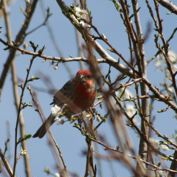September Song
Summer is slowing down and easing its way into fall, though the dates on the calender don’t seem to be in synch with the world outside. The time seems right for a little time with the icon of West Coast Cool, Chet Baker. There is nothing fussy or over-done in Chet’s music, and always one finds an inwardness, and a communication with the real feelings at the heart of each song. There is a wholeness and integrity of expression and delivery, rarely found elsewhere, even with the best musicians. This is where Chet’s unique genius is most evident, and it is what makes him unforgettable for me.
with the world outside. The time seems right for a little time with the icon of West Coast Cool, Chet Baker. There is nothing fussy or over-done in Chet’s music, and always one finds an inwardness, and a communication with the real feelings at the heart of each song. There is a wholeness and integrity of expression and delivery, rarely found elsewhere, even with the best musicians. This is where Chet’s unique genius is most evident, and it is what makes him unforgettable for me.
And here is the late, great Chet Baker at his best, with an extravaganza of cool, moody standards, in a recording made on October 24, 1955 at the Pathé-Magellan studio in Paris.
 This comment accompanied the original Youtube upload:
This comment accompanied the original Youtube upload:
This was a re-scheduled recording, as the original pianist (and also Chet’s best friend and mentor) Dick Twardzick died in his hotel room from a drug overdose as Chet and the rest of the quartet waited for him at the studio. Chet then fell out with his drummer, and two little-known European musicians were hastily recruited for the re-scheduled session three days later.
This beautifully crafted recording reveals a depth of emotion and character that had not previously existed in his playing.
The other musicians in the quartet are Gérard Gustin -piano, Jimmy Bond -bass and Bert Dahlander-drums.
Musicians like Chet Baker are miracles of their own genre, in Chet’s case, Cool Jazz, and no one can express a moods embedded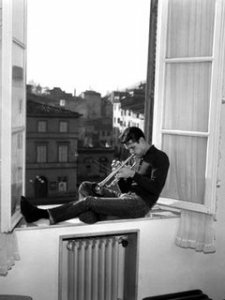 in these rich compositions quite like he can. He crafts and composes each phrase, each line, each note, connecting them seamlessly, with just the right length of a pause to permit the ear to absorb and the mind to integrate the sounds and feeling. It really feels like pure magic to me. I feel the ethos of his era, and movies languidly spool out their visual accompaniment in my compliant imagination.
in these rich compositions quite like he can. He crafts and composes each phrase, each line, each note, connecting them seamlessly, with just the right length of a pause to permit the ear to absorb and the mind to integrate the sounds and feeling. It really feels like pure magic to me. I feel the ethos of his era, and movies languidly spool out their visual accompaniment in my compliant imagination.
It is a spell, an enchantment to which surrender is the best response – where sounds and images and only a mere smattering of almost unneeded words serve to effect the communication. The result is a feeling of internal fullness, of spilling and swimming in a re-emergence of impressions, dreams and daydreams, of filtered sunlight, print dresses, absorbing novels, cold beer, the smell and feel of summer, sidewalks damp from watering, rustling leaves, stillness, blue sky….
It is well known that Chet, like many of his fellow musicians like Bill Evans, used drugs, and it is likely that drugs were a part of their creative process. The ordinary consciousness with which we go about our daily business is not usually supportive of the creative 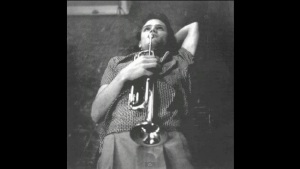 process, which requires inwardness, and freedom from business and routine. Our daily tasks are firmly rooted in the domain of unconsciousness and distraction, and in the capable hands of what Colin Wilson referred to as our robot consciousness.
process, which requires inwardness, and freedom from business and routine. Our daily tasks are firmly rooted in the domain of unconsciousness and distraction, and in the capable hands of what Colin Wilson referred to as our robot consciousness.
Musicians in particular know this, and since the creative state cannot easily be entered ‘at-will’, it must often be induced, and this is something drugs are known to facilitate. There is a balancing point to be found between the outright endorsement of drug-use and the moral judgements passed by society on addicts. I think it is important to find this place, and to try and understand perhaps why so many musicians and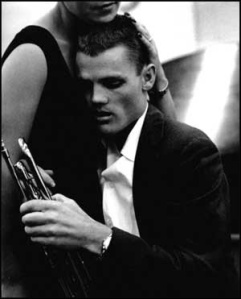 performers use drugs. Performers do not have the luxury of scheduling gigs and performances when they are in an optimum creative state. It is imperative that they be able to switch it on in time for a performance or a recording session, and drugs may provide an easy short-cut.
performers use drugs. Performers do not have the luxury of scheduling gigs and performances when they are in an optimum creative state. It is imperative that they be able to switch it on in time for a performance or a recording session, and drugs may provide an easy short-cut.
I am not a musician, but I know that the wonderful music I often hear in my dreams, comes from a part of me I am unable to access when I am awake. Even when music does come to me, I am only able to ‘go along’ with it while it is actually unfolding, and I can never recall it, though I know it to have been unique and wonderful, and a true expression of my own inaccessible creativity.
Chet paid an enormous price for his creativity, and his music. Addiction can be brutal, and Chet lost his front teeth and his embouchure when he was assaulted by thugs. One of his girlfriends, the singer Ruth Young, implies that Baker might have brought this misfortune on himself by antagonising someone who then hired people to rough him up, but we will never know the truth with any degree of certainty, in  part because of Young’s own reason for believing such a story, and in part because of Chet’s own tendency to embellish incidents in his life so as to present the kind of image he wished to project.
part because of Young’s own reason for believing such a story, and in part because of Chet’s own tendency to embellish incidents in his life so as to present the kind of image he wished to project.
Nevertheless, the assault was followed by a very dark period in Chet’s life. Unable to play the trumpet, he spent five years between the time of his assault, and his next gig (which lasted for two weeks and was set up for him by Dizzy Gillespie) pumping gas and doing other menial jobs. Eventually Chet re-emerged from his fog, and taught himself to play again, and eventually to recover his sound.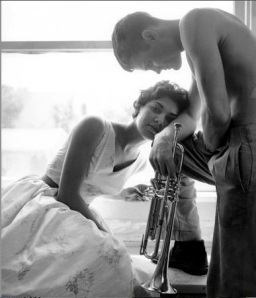
To my ear, at least, the appeal of Chet’s unique sound, is due in part to how beautifully he sustains his phrases. Even his speech was slow and measured. The sound is unforced, perhaps because it is so much like breathing. The romantic fluency and flowing lyricism with which he imprints his music, and the style referred to as West Coast jazz or ‘Cool Jazz, is at the heart of this genre, ‘Cool’ has the mood of warm beaches and breeze, and the moods they induce, but of course much more than the lazy carefree feeling of ease and openness. There is the slow savouring of thoughts and emotions, dictated by a pace which matches that of unhurried reflection. Cool gives our feelings their due. Chet’s music had a universal appeal.
Chet’s music was loved and admired in Europe, even though a supposed drug-bust in Italy resulted in a 16-month jail term, (its never a good thing to run afoul of the authourities in Italy) and being treated persona non grata in several European countries. Chet spoke French and Italian with a remarkable degree of fluency. He sand in Italian, and starred in a movie Hell’s Horizon.
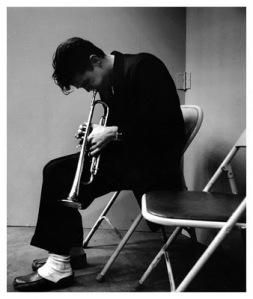 Shortly before Chet’s death Brice Weber was making a semi-documentary film of Chets life called Let’s Get Lost. By that time, Chet had begun to resemble a beautiful ruin, his movie-star good looks long since having given way to a face on which his difficult history was uncompromisingly recorded. Still, he never lost his touch, and continued to sing and play right to the end of his life.
Shortly before Chet’s death Brice Weber was making a semi-documentary film of Chets life called Let’s Get Lost. By that time, Chet had begun to resemble a beautiful ruin, his movie-star good looks long since having given way to a face on which his difficult history was uncompromisingly recorded. Still, he never lost his touch, and continued to sing and play right to the end of his life.
In May of 1988, Chet was found dead outside his hotel room in the Netherlands. The autopsy revealed traces of drugs in his system. The death was ruled accidental, the official view was that he fell out of his second storey window. A friend who checked the room after the ‘accident’ remarked that the window was old, and did not open far enough to allow someone to fall out of it.
Weber’s film was completed shorty after Chet died. It is an astonishingly beautiful movie, filmed in lush black and white, and featuring recreated scenes, as well as scenes from Chet’s movies, in-depth interviews with Chet’s friends, associates, fellow-musicians, girlfriends, ex-wife Carol Baker, his mother and his children. It is worth watching, for anyone who would wish to know more about the life of this very human and very flawed man, who was despite all his tragedies and set-backs, nevertheless an astonishingly wonderful musician.
























































































































